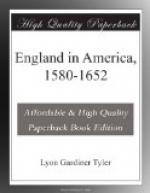When Williams appeared for this purpose, in January, 1634, the objections of the court shifted to some vague phrases in the document which they construed to reflect upon the king. These expressions were readily explained by Williams, and he was promptly forgiven by the court on his professing loyalty and taking the usual oath of allegiance to his majesty.[4] Perhaps this singular behavior on the part of the court is explained by the apprehension generally felt that Ferdinando Gorges, in England, would succeed in his attempt to vacate the charter of Massachusetts. If the charter had been successfully called in, Williams’s ground of the sufficiency of the Indian title to lands might have proved useful as a last resort.[5]
Nevertheless, in November, 1634, the authorities were on his track again. The pretext now was that Williams “taught publicly against the king’s patent,” and that “he termed the churches of England antichristian.” This revamping of an old charge which had been explained and dropped was probably due to a change of attitude towards the English government. In May, 1634, the general court elected the intolerant deputy governor, Thomas Dudley, governor in the place of Winthrop; and when in July the news of the demand of the Lords Commissioners for Foreign Plantations for the surrender of the colony charter was received at Boston, the new governor took steps, as we have seen, to commit the colony to a fight rather than yield compliance.[6]
Nothing, however, resulted from the charges against Williams, and it was not until March, 1635, that he again excited the wrath of the government. Then his scruples took the shape of objections to the recent legislation requiring every resident to swear to defend the provincial charter. Williams declared that the state had no right to demand an oath of an “unregenerate man,” for that “we thereby had communion with a wicked man in the worship of God and caused him to take the name of God in vain.”
Williams was, accordingly, summoned to Boston in April, and subjected to confutation by the ministers, but positive action was deferred. While the matter remained thus undetermined, the church at Salem elected him teacher, and this action was construed as a contempt on the part of both Williams and the Salem church. Accordingly, when the general court met in July, 1635, Haynes now being governor, it entered an order giving them till next court to make satisfaction for their conduct. At the same court a petition of the Salem church for some land in Marblehead Neck was rejected “because they had chosen Mr. Williams their teacher.”
Affairs had now drawn to a crisis. The Salem church wrote a letter to all the other churches protesting against their treatment, and Williams notified his own church that he would not commune with them unless they declined to commune with the other churches of the colony.




